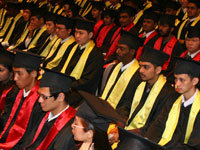Private Education Route for Bachelor's Degree Programmes and Professional Qualifications
by StudyMalaysia.com on March 11, 2015 | Higher Education in Malaysia

A. BACHELOR’S DEGREE PROGRAMMES
Development of Bachelor’s Degree Programmes
From the early 1980s, Malaysian private colleges pioneered in the provision of trans-national Bachelor’s degree programmes in this region, collaborating with reputable universities from countries like UK, USA, Australia, New Zealand, etc. These unique collaborative Bachelor’s degree programmes include ‘advance standing’ arrangement, American degree credit transfer programme, ‘2+1’ twinning degree and 3+0 franchised degree programme.
In 1998, there was another breakthrough in the provision of Bachelor’s degree programmes with the setting up of Monash University’s branch campus in Malaysia, offering exactly the same degrees as the main campus located in Australia. Thereafter, other foreign university branch campuses such as The University of Nottingham and others were set up to offer degree programmes in Malaysia.
The presence of foreign university branch campuses in Malaysia (offering courses ranging from Bachelor’s degree to postgraduate levels) as early as 1998 is another effort by Malaysia to be a pioneer in higher education in this region. Thus, together with home-grown private universities, many diverse range of Bachelor’s degree programmes have created by private higher educational institutions (PHEIs) for students to choose from.
Many Options for Bachelor’s Degrees
Private higher educational institutions provide many study options for students intending to pursue Bachelor’s degree programmes in Malaysia. These institutions are:- Foreign University Branch Campuses located in Malaysia
- Malaysian Private Higher Educational Institutions
- Private universities
- Private colleges that offer twinning degree programmes
The flexibility of studying a Bachelor’s degree is that students have a wide choice of universities or colleges at a budget best suited to them as well as the mode of programme, such as 3+0, twinning degree, degree qualification awarded by a foreign university branch campus or a home-grown career relevant degree programme.
Types of Bachelor’s Degree Programmes Available in Malaysia
1. Twinning Degree Programmes (‘2+1’)Malaysia is well known for its International Degree Qualifications like the undergraduate twinning degree (‘2+1’, ‘1+2’) programmes, where students pursue the first or second year of the degree programme in Malaysia and the final part overseas.
Twinning degree programmes started in Malaysia about 20 years ago and have since been very popular with students as a way to achieve an international Bachelor’s degree. In a twinning programme, students can complete either 1 year; 1½ years; 2 years; or 2½ years in Malaysia, out of the 3-year degree programme before going to the partner university overseas to complete the degree. The Malaysian educational institutions normally collaborate with well-known universities from the United Kingdom, Australia, the United States, New Zealand, France as well as Germany for these modes of study.
Other unique features of these type of programmes are that students register with both the local institution as well as the overseas university (dual registration) and are guaranteed admission to the next level in the overseas twinning university. The curriculum and course materials are provided by the partner university although taught locally (for the number of years the students choose to study in Malaysia). However, in some cases, some local content are introduced to meet the local authority’s requirements. The examination is set and marked by the overseas partner university and the result transcripts are issued by them. The degrees will also be awarded by the overseas partner university.
Benefits of a Twinning Degree Programme
Students get to acquire a foreign degree qualification with substantial savings
on tuition fees and living expenses for the number of years spent studying in
Malaysia. They also acquire the learning experience of two countries. For
example, for a Law degree, one can save up to RM50,000 (USD13,800 ) on tuition
fees (excluding living expenses) if one were to pursue a ‘2+1’ twinning degree
of a reputable UK university at an established private institution in Malaysia.
| Table 8.1 Examples of PHEIs’ Foreign Twinning Partner-Universities | |
|---|---|
| UK Universities | Inti College partners Coventry
University for its Business Degree programmes
|
| Australian Universities | KBU International College partners University of South
Australia for selected Engineering Degree programmes
|
| USA Universities | International College of Music partners Berklee College
of Music, Boston for its Music Degree programme
|
| German University | KBU International College partners Mannheim University of Applied Sciences for its Engineering Degree |
| French University | Taylor’s College partners University of Toulouse for its Hospitality Management Degree |
Source : Respective institutions’ websites & StudyMalaysia.com
2. ‘3+0’ Degree Programmes
The ‘3+0’ programme is basically an extension of the ‘2+1’ twinning programme
allowing students to complete all three years of the partner university’s degree
at Malaysian institutions. This innovative arrangement started in 1998. These
institutions are permitted by the foreign partner universities in countries like
the United Kingdom, the United States, Australia and France to conduct the
entire Bachelor’s degree programme in Malaysia with the foreign partner
university awarding the degree qualification. Therefore, unlike the twinning
programme, students do not need to go to the host country to complete their
studies, unless they opt to do so.
Under this type of programme, a student does dual registration, that is, the student registers with the Malaysian institution as well as the host university. Therefore, students are subjected to the same method of assessment as that of the host university.
As such, you can now have a choice of graduating with either a Bachelor’s degree from the United Kingdom, United States, France or Australia completely on Malaysian soil!!! This means that students doing the ‘3+0’ degree programme follow the same syllabus and obtain the same qualifications as students in the host university overseas.
Benefits of a ‘3+0’ Degree Programme
It is definitely more economical because the entire course fees and the living
expenses for the duration of the course are paid in Malaysian Ringgit which will
result in a lower cost of study for the student. Students can thus expect to
save about RM90,000 to RM150,000 (USD25,000 to USD41,600) for the entire degree,
depending on the course of study and the foreign partner university involved.
For example, the total tuition fees for a 3-year Business Degree is estimated to
range from RM39,000 to RM52,000 (USD10,800 to USD14,400). Thus the ‘3+0’ degree programme assures substantial savings.
Quality Assured
The ‘3+0’ degree programme is approved by the Ministry of Higher Education and
as such, the institutions offering such programmes are constantly under the
scrutiny of the national quality assurance agency, MQA (Malaysian Qaulifications
Agency). The foreign partner university will also send lecturers to the
Malaysian institution to lecture as well as conduct regular audits on the
Malaysian institution. Britain’s Quality Assurance Agency (QAA) will audit the
quality of ‘3+0’ degree programmes in collaboration with foreign partner
universities from the United Kingdom. Therefore, students can be assured that
the ‘3+0’ degree programmes offered by PHEIs in Malaysia are NOT in any way
inferior to those provided by the foreign partner university.
| Table 8.2 Examples of Foreign Universities Collaborating with PHEIs in Malaysia to Offer ‘3+0’ Degree Programmes (arranged by country) | |
|---|---|
| UK | Australia |
| University of Staffordshire with Asia Pacific Institute of Information Technology | Deakin University with Stamford-Disted College |
| University of Northumbria at Newcastle with KDU College | Charles Sturt University with HELP University College |
| University of Teesside with Binary University College & MAHSA College | Murdoch University with KDU College |
| University of Abertay Dundee, Scotland with SEGi College | University of Wollonggong with INTI College (Sarawak) |
| Anglia Ruskin University with IGP College & KBU International College | Curtin University of Technology with Metropolitan College & Limkokwing University of Creative Technology |
| University of Westminster with International College Of Music | Swinburne University of Technology with Limkokwing University of Creative Technology |
| Coventry University with INTI International University College & Inti College Subang Jaya | RMIT University with Metropolitan College |
| University of Bradford with INTI International University College | La Trobe University with Nilai International College |
| University of Hertfordshire with INTI International University College & Inti College Sarawak | University of Southern Queensland with SEGi College |
| The Nottingham Trent University with KBU International College | Edith Cowan University with SAL College |
| Oxford Brookes University with Nilai International College | University of South Australia with HELP International College of Technology, & Taylor’s College Petaling Jaya |
| &University of The West of England with Taylor’s University College | Victoria University of Technology with Sunway University College |
| University of Greenwich with SEGi College | University of Ballarat with Unity International College |
| University of Sunderland with Binary University College & SEGi College | University of Technology Sydney with Taylor’s University College |
| France | USA |
| University of Toulouse Le Mirail with Taylor’s College | Southern New Hampshire University with HELP International College of Technology (formerly S.I.T International College) |
| Switzerland | Troy University with Putra International College |
| International Hotel Management Institute (IMI) with KDU College | Upper Iowa University with SEGi Graduate Studies College |
| California State University, Long Beach with TPM College | |
Source: Institutions’ websites & StudyMalaysia.com Research Team
3. International Degrees from Foreign Universities Located in Malaysia
There are four reputable foreign universities which have set up campuses here
for undergraduate and postgraduate studies. The first was Monash University,
Australia which was established in 1998.
Curtin University of Technology Sarawak Campus; University of Nottingham Malaysia Campus; and Swinburne University of Technology Sarawak Campus were subsequently set up here in Malaysia too. Students now have a wider range of courses and institutions to choose from. Students can also opt to study at the host university (e.g., Monash University in Australia) for one or two semesters. Likewise, students can also obtain their double degree qualification from the foreign university branch campus here.
| Table 8.3 Examples of Foreign University Branch Campuses in Malaysiath> | |
|---|---|
| Name of Branch Campus & year established in Malaysia | Country of Origin |
| Monash University Malaysia, 1998 | Australia |
| Curtin University of Technology Sarawak Campus, Malaysia, 1999 | Australia |
| The University of Nottingham Malaysia Campus, 2000 | UK |
| Swinburne University of Technology Sarawak Campus, 2004 | Australia |
Benefits of Studying at a Branch Campus of a Foreign University
Students who chose to study at branch campuses here found that they spent only
half the amount of what they would have spent studying at the foreign partner
university in Australia or the UK. This is due to the substantial amount of
savings from lower costs of tuition fees and living expenses.
Nevertheless, students have the opportunity to study for one or two semesters at the foreign partner university while paying the Malaysian branch campus tuition fees! This is a unique chance for students to experience living and studying overseas without having to pay additional tuition fees. Further, these local campuses of foreign universities also offer postgraduate courses for students who wish to further their studies after completing their Bachelor’s degree programme.
| Table 8.4 : A Cost Comparison Example for an Australian Bachelor’s Degree in Computer Science (3 years) |
||
|---|---|---|
| Item | Australian Branch Campus in Malaysia (Estimated cost) | Australian University (Estimated Cost) |
| Tuition Fees | RM29,400 | A$23,110 |
| Living Cost | RM12,000 | A$18,000 |
| Average Education Cost for one (1) year | RM41,400 | A$41,110 |
| TOTAL EDUCATION COST FOR THREE (3) YEARS | RM124,200 (USD34,500) |
A$123,330 (USD99,300) |
Source: StudyMalaysia.com Research Team,
www.monash.edu.my & www.monash.edu
Currency Conversion Rate: A$1=RM2.90 RM1=3.60
Note: The above cost is only an estimate.
4. Degrees from Malaysian Private Universities Malaysian Private Universities award their own degree qualifications to students who have completed their studies and fulfilled the requirements set by the university’s academic board. The first private university in Malaysia was established in 1999.
Local or home-grown degrees are degree programmes developed internally by Malaysia’s private universities which comply with international quality assurance best practices and education excellence. Their programmes are under strict scrutiny of the Malaysian Qualifications Agency (MQA) to ensure compliance to the standards set by the Board. Many private universities also have the recognition of foreign and local professional bodies. They collaborate with reputable foreign universities which possess international quality education benchmarking.
Many private universities also collaborate with local research agencies, industries and top ranking universities in the world to conduct research, and staff exchange and development programmes.
In a history of less than 10 years, some private universities have developed quickly and gained international recognition and acceptance. This is evident in the increasing number of International Students.
There are also universities that have been granted the status of university-college by the Government. Such higher education institutions were previously private colleges which have shown good track record in conducting ‘3+0’ degree programmes. In terms of an institution’s autonomy in awarding its own degree programme, there is no difference between an institution with university or university-college status.
The main difference is that a university-college is a specialist university focusing on certain disciplines of study with lower student enrolment capacity. Many of these universities continue to collaborate with its ‘3+0’ degree university-partners to internationalise their degree programmes. Some of these university-colleges are well recognised by their foreign university-partners. A student can study one degree programme and graduate with two degree qualifications (one degree certificate from the university and the other from the overseas university-partner) at the cost of one degree, without leaving Malaysia.
The areas of study include Business, Life Science, Applied Science, Engineering, Hospitality, Creative Art, Social Science, IT, Medicine, Dentistry & Pharmacy.
Benefits of Locally-Developed Degrees
Here, it is obvious that the main benefit of pursuing a locally degree is the
relatively cheap course fee with the added advantage of a globally recognised
qualification. Such degree programmes have made these universities a much
sought-after place by both local as well as International Students.
5. American Degree Program is Well-Developed in Malaysia
American Degree Programs started in Malaysia in the mid-1980s. Students pursuing
the 4-year American Bachelor’s Degree study in Malaysia for two years (or 40 to
70 credits) before moving on to their choice of university in America. Students
can select from 200 American universities where they can transfer their credits
earned in Malaysia.
A student in Malaysia intending to study in America can collect sufficient credit through the Malaysian institution and then apply to an American university. The Malaysian institution is not bound to a particular American university and similarly, no American university is obliged to take in a student under the credit transfer scheme unless the American university is satisfied with the student’s entry qualifications. This is because each American university sets its own requirements and formulates its own courses. Consequently, experienced private colleges formulate their course curriculum taking into consideration the requirements of the American university curriculum. As a result, many aspiring students have earned places in reputable American universities.
Currently, besides the American Degree Transfer Programme, there are also Australian Degree Transfer Programmes, UK Degree Transfer Programmes and Canadian University Transfer Programmes offered by private higher educational institutions in Malaysia.
As a pioneer in international education in this region, Malaysia offers access to more than 300 prestigious universities in the USA, UK, Australia, New Zealand and Canada.
6. External Degree Programmes
External degree programmes offered by foreign universities have long been
established in Malaysia. Dating back to the early 1980s, the most popular
programmes were from the University of London. Due to the demand for
international Bachelor’s degrees, Malaysian educational institutions began
offering what is known as the ‘External Degree Programme’. In this programme, a
student in Malaysia will become an ‘external’ student of the overseas university
while studying in Malaysia. The overseas university sets the entry requirements,
syllabus and examinations. However, the overseas university does not play an
active role in teaching the students. This is yet another avenue in acquiring a
foreign university Bachelor’s degree qualification without leaving Malaysia.
Many Malaysian private colleges have proven track records in guiding students in successfully acquiring degrees under the external programme. A good example is the University of London’s Law and Management programme. The University of London offers well-known foreign external degrees in Economics, Management, Law, Finance, Banking and Information Systems.
Benefits of an External Programme
Once again, the main advantage is the much reduced cost of tuition fees and
living expenses when compared to studying abroad. Many such external degrees are
popular among General Information on Malaysian Higher Educations who have just obtained SPM or STPM
qualifications; or O and A Level certificates in the case of international
students.
7. Earn a Bachelor’s Degree through Distance Learning
Earning a Bachelor’s degree through distance learning is no longer a new thing
for Malaysia. Malaysia’s home-grown higher educational institutions such as Open
University of Malaysia, Universiti Tun Abdul Razak and Malaysia Multimedia
University conduct distance learning programmes with the approval and quality
assurance from the national quality assurance agency MQA.
Students learn at their own pace through online tutorials and course materials from the institution. However, students are required to attend a number of face-to-face tutorials at the institution’s premises.
Benefits of Distance Learning
Distance learning provides the flexibility of acquiring the degree at your
own pace and at a reduced cost.
8. The Degree Pathway through Advanced Standing Programmes
‘Advance standing’ arrangements with universities from UK, Australia, Canada,
Taiwan, etc. have been developed by private colleges in Malaysia since the early
1980s.
‘Advanced Standing Programme’ means the respective private college’s internal Diploma programmes are validated and moderated with ‘advanced standing’ entry status by one or more foreign universities. Students are allowed to proceed at the second or third year of the degree programmes overseas.
In other words, ‘advanced standing’ means recognition (full or part) is given by a foreign university of a particular course pursued at a Malaysian private higher educational institution that allows a student advanced entry into the foreign university’s degree programme.
Benefits of Advanced Standing Programmes
- Opportunity to acquire a degree qualification awarded by a foreign university
- Substantial cost saving
- Students have a wide option of universities and courses
- Students have the advantage of experiencing learning in two countries
B. STUDYING FOR A PROFESSIONAL QUALIFICATION AWARDED BY PROFESSIONAL EXAMINATION BOARDS
In the early 1970s, private institutions started to provide tutorial support to students pursuing external examinations leading to a semi-professional or professional qualification.PHEIs have good track record in providing classes that prepare students for external examinations set by the various local and foreign examination bodies / professional boards which award a range of qualifications.
Generally, there are two types of examination bodies or boards:
- ‘Qualifying’ Examination Bodies
These are examination bodies of professional associations of a specific skill or trade. They set the course syllabi / curricula, conduct examinations and confer qualifications related to their specific skill or trade, e.g. accountancy, law, medicine or engineering. These bodies will only award membership privileges to those who are qualified i.e. those who have passed their professional examination or other qualifications; and fulfilled other job experience requirements, if any.
Entry Requirements
Students are required to register with these bodies in order to sit for the professional examination. Some of these professional associations / boards include the Malaysian Institute of Certified Public Accountants (MICPA-Malaysia); Chartered Association of Certified Accountants (ACCA-UK), Engineering Council-UK; Institute of Chartered Secretaries & Administrators (ICSA-UK); Chartered Institute of Management Accountant (CIMA-UK); etc. Upon passing the examination, students are qualified to be admitted as members of the associations. However, some associations impose additional requirements such as minimum age and relevant working experience for admission.
Students with Malaysian STPM qualifications or its equivalent such as local university foundation programmes or international pre-tertiary qualifications such as GCE A Level, AUSMAT, SAM, and CPU are generally accepted as ‘student members’ to sit for the professional examination concerned. - ‘Academic’ Examination Bodies
These bodies are managed by institutions or organisations of international standing. Qualifications are awarded to those who have passed the examination. They are not associations or bodies representing their specific professions and do not offer membership, but are examination bodies that only set the syllabi, conduct the examinations and confer the qualifications.
The qualifications awarded are varied. These can be certificate, diploma, post-secondary, pre-university, semi-professional or other equivalent levels. With such qualifications, graduates can either commence a career or continue higher education at a Bachelor’s degree or professional level.
Some of these qualifications are:- Awarded by semi-professional bodies e.g. Institut Bank-Bank Malaysia - Malaysia; SKM - Malaysia; LCCI Examination Board - UK; National Computing Centre - UK; Chartered Institute of Marketing – UK; etc.
- Awarded by universities or government agencies for pre-university qualification, e.g. GCE A Level, SAM, AUSMAT, and Canadian Pre-U.
Entry Requirements
The general entry requirement to obtain qualifications awarded by ‘Academic Examination Bodies’ is SPM or its equivalent.
English Competency Requirement
Proficiency in the English language is an important requirement by PHEIs. Students are expected to have adequate knowledge and understanding of English, as this is the language of instruction at private colleges and universities. Various international examinations such as the GCE 1119, MUET (Malaysia University English Test), TOEFL and IELTS are recognised as English proficiency standards and form part of the entry requirements for Bachelor’s degree programmes. The table below depicts the accepted English Proficiency Standard at most PHEIs.
| Table 8.5 : Accepted Scores of English Proficiency Tests | |
|---|---|
| English Proficiency Test | Required Scores for First Degree Programmes |
| TOEFL | 173 to 250 on a new computer administered test (equivalent to a score of 500 to 600 on the old paper-based test format) |
| IELTS | 6.0 to 7.0 |
| MUET | Band 3 to 6 |
Cost of Studying Bachelor’s Degree Programmes
Malaysian Bachelor’s degree programmes offer very competitive tuition fees which is why many of our International Students favour Malaysia as their destination for undergraduate degree programmes. The table below displays the estimated tuition fees for selected Bachelor’s degree programmes:| Table 8.6 Tuition Fees - Bachelor’s Degree Programmes (in RM/USD) | |||
|---|---|---|---|
| Area of study | Paths of Study | ||
| Estimated Tuition Fees Required to Complete a Bachelor’s Degree in Malaysia via | |||
| Path (i) Private Colleges’ 3+0 Foreign Degree Programme RM (USD) | Path (ii) Foreign University Branch Campuses’ Degree Programme RM (USD) | Path (iii) Malaysian Private Universities’ Degree Programme RM (USD) | |
| Business | RM39,000 - 52,000 (USD10,800 - 14,400) (3 yrs) | RM48,000 - 84,000 (USD13,300 - 23,300) (3yrs) | RM30,000 - 40,000 (USD8,300 - 11,100) (3 yrs) |
| Engineering | RM45,000 - 47,000 (USD12,500 - 13,000) (3yrs for UK degree) | RM82,000 - 102,000 (USD22,700 - 28,300) (4 yrs for Aust Degree) (3yrs for UK degree) |
RM46,000-52,000 (USD12,700 -14,400) (4yrs for Malaysian degree) |
| IT | RM33,000 - 40,000 (USD9,200 – 11,100) (3yrs) |
RM52,800 - 84,000 (USD14,600 – 23,300 (3 yrs) |
RM33,000 - 43,000 (USD9,200 - 11,900) (3 yrs) |
| Medicine | - | RM325,000 (USD90,300) (5yrs) | RM250,000 - 333,000 (USD69,400 - 92,500) (5yrs) |
| Hospitality & Tourism | RM45,000 -48,500 (USD12,500 – 13,500) (3 yrs) | - | RM31,000 - 55,000 (USD8,600 - 15,300) (3 yrs) |
| Music | RM54,000 (USD15,000) (3 yrs) | - | RM53,000 - 59,000 (USD14,700 – 16,400) (3 yrs) |
Source: StudyMalaysia.com Research Team
| Table 7.8 Tuition Fees (RM) - External Professional Qualifications (in RM/USD) | |
|---|---|
| The Chartered Association of Certified Accountant, UK (ACCA) The Chartered Institute of Management Accountant, UK (CIMA) Institute of Chartered Secretaries & Administrators, UK (ICSA) |
RM10,000 – 12,000 (USD2,800 - 3,300) RM10,000 – 16,000 (USD2,800 - 4,400) RM10,000 – 12,000 (USD2,800 - 3,300) |
Source: StudyMalaysia.com Research Team
Estimated Exchange rate : USD1=RM3.6
References
- Education Guide Malaysia (10th Edition)
- Study in Malaysia Handbook (6th International Edition)
- Various PHEI websites
- jpt.moe.gov.my
 Source: Study in Malaysia Handbook 6th Ed. - Chapter 7
Source: Study in Malaysia Handbook 6th Ed. - Chapter 7All rights reserved. No part of this editorial contents may be reproduced, copied, translated, or stored in a retrieval system or transmitted in any form or by any means without the written consent from the publisher Challenger Concept (M) Sdn Bhd (www.studymalaysia.com/challenger)
You May Also Be Interested In...
A Glance At The Malaysian Education System
![A Glance At The Malaysian Education System - StudyMalaysia.com]() Children in Malaysia begin their education as early as at the age of f...
Children in Malaysia begin their education as early as at the age of f...Study Options after SACE
![Study Options after SACE - StudyMalaysia.com]() Congratulations to all students on your achievement in the South Austr...
Congratulations to all students on your achievement in the South Austr...The Malaysian Higher Education System - An Overview
![The Malaysian Higher Education System - An Overview - StudyMalaysia.com]() A Snapshot of Higher Education Institutions in Malaysia The higher ed...
A Snapshot of Higher Education Institutions in Malaysia The higher ed...Deciding Where And What To Study
![Deciding Where And What To Study - StudyMalaysia.com]() “Your best years in education are those spent in college or universi...
“Your best years in education are those spent in college or universi...Private Education Route for Bachelor's Degree Programmes and Professional Qualifications
![Private Education Route for Bachelor's Degree Programmes and Professional Qualifications - StudyMalaysia.com]() From the early 1980s, Malaysian private colleges pioneered in the prov...
From the early 1980s, Malaysian private colleges pioneered in the prov...Bachelor Degrees
![Bachelor Degrees - StudyMalaysia.com]() BA, Bsc, BEng, LLB – Hons or without – major, minor and specialisa...
BA, Bsc, BEng, LLB – Hons or without – major, minor and specialisa...





























